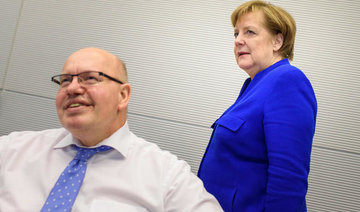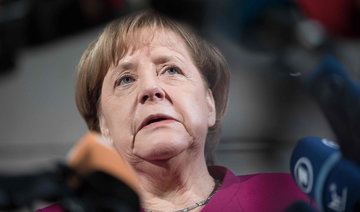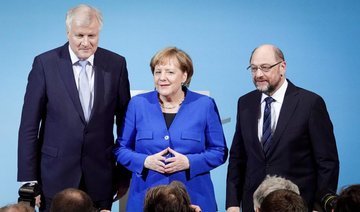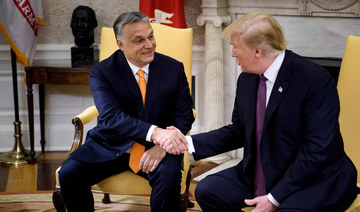BERLIN: Angela Merkel’s conservatives and their Social Democrat (SPD) partners faced a chorus of skepticism on Thursday as allies and opponents alike criticized a loveless coalition deal that some said showed the German chancellor’s time was coming to an end.
The shotgun deal, reached in record time after Merkel earlier failed to form a coalition with two smaller parties, faces its first test when the SPD’s restive membership vote next month on whether to ratify a deal many never wanted.
But Merkel’s camp was also forced to defend a deal that sees the conservatives cede the crucial finance minister post in exchange for a fourth term in office for the woman who has dominated European politics for the past 12 years.
Both camps had to make major sacrifices to secure a deal. The agreement promises an unusual half-time review after two years, when the parties will reassess the coalition — a possible opportunity for Merkel finally to step down.
“This government could be captioned ‘Won’t last long’,” wrote Kurt Kister, editor of the Sueddeutsche Zeitung newspaper.
Even that may prove optimistic if SPD leader Martin Schulz fails to persuade the party’s 464,000 members to ratify the deal in a postal ballot, the results of which will be announced on March 4.
The center-left party saw its previous four years in “grand coalition” with the conservatives rewarded with its worst poll result in decades in September’s national election, and the slide continues.
The SPD was on 18 percent in a GMS poll on Thursday, the lowest ever, only four points ahead of the far-right Alternative for Germany (AfD). Together, the two grand coalition parties barely scored 50 percent.
Opponents of the deal say Schulz’s team failed to set a left-wing stamp on the program, which continues to promise the budget discipline that has been the hallmark of Merkel’s three governments. It is unclear if they will be persuaded by his response that the SPD will control top ministries, including foreign affairs and finance.
Paradoxically, the political right’s dismay could win over more reluctant SPD members. Mass-selling daily Bild said Merkel had sold out. “Chancellor at any price,” Bild wrote on its front page. “Merkel gifts the SPD the government.”
In a reminder of how indispensible Berlin has become to European affairs, the ill-temper in Germany was not matched in other capitals, where news that an end was in sight to four months of uncertainty was greeted with relief.
Germany’s coalition agreement this week opens the way for convergence with France on reform of the euro zone, said French Finance Minister Bruno Le Maire.
“There’s things in the coalition agreement that are very positive,” he told a capital markets conference in Paris.
Senior figures in both camps were happy to acknowledge that the coalition, born of painful necessity, was nobody’s first choice. And some had little time for the critics.
“I can’t take this Merkel bashing and talk of selling out any more,” said Kai Whittaker, a lawmaker for her Christian Democrats (CDU). “This self-pitying rolling in the mud reminds me of a spoiled child stamping in anger.”
Skepticism and relief for Germany’s shotgun coalition
Skepticism and relief for Germany’s shotgun coalition

North Korea sends balloons with trash into South again

North Korea is “once again floating balloons carrying waste toward the South,” the JCS said in a text message to reporters.
SEOUL: North Korea again sent trash-carrying balloons into the South on Saturday, the South Korean military said, a day after Seoul warned of countermeasures against such activity.
Earlier this week, North Korea sent around 260 balloons carrying bags of trash, including waste batteries, cigarette butts and what appeared to be manure, according to the South Korean Joint Chiefs of Staff.
Authorities in Seoul condemned that act as “low-class,” and the South Korean unification ministry warned Friday that the government would take countermeasures if Pyongyang did not cease such “irrational” provocations.
North Korea is “once again floating balloons carrying waste toward the South,” the JCS said in a text message to reporters.
It advised the public to refrain from touching the balloons if spotted and to report them to authorities.
The Seoul city government also sent a text alert to residents on Saturday, warning of an “unidentified object presumed to be North Korean propaganda leaflets.”
The object has been “detected in the airspace near Seoul and is currently being addressed by the military,” it said, advising residents to “refrain from outdoor activities.”
Pyongyang defended its release of the balloons earlier this week, saying the “sincere gifts” were retaliation for the balloons sent into North Korea with propaganda against leader Kim Jong Un.
North Korea has long been infuriated by the balloons sent by South Korean activists, which carry anti-Pyongyang leaflets. Sometimes, they have also sent cash, rice or USB thumb drives with South Korean drama series.
South Korean defense minister Shin Won-sik on Saturday said North Korea sending balloons with waste was “unimaginably petty and low-grade behavior.”
He added that the balloons sent into the North by activists were “humanitarian aid balloons.”
In 2018, during a period of improved inter-Korean relations, the leaders of the two Koreas agreed to “completely cease all hostile acts against each other in every domain,” including the distribution of leaflets.
The South Korean parliament passed a law in 2020 criminalizing the act of sending leaflets to the North, but the activists did not stop.
That same year, Pyongyang, blaming the anti-North leaflets, unilaterally cut off all official military and political communication links with the South and blew up an inter-Korean liaison office on its side of the border.
Last year, South Korea’s Constitutional Court struck down the 2020 law, calling it an undue limitation on free speech.
Kim Jong Un’s sister Kim Yo Jong — one of North Korea’s key spokespeople — mocked South Korea for complaining about the balloons this week, saying North Koreans were simply exercising their freedom of expression.
Heatwave, election workers’ deaths mar final phase of India’s giant vote

- Modi and Gandhi urge voters to visit polling stations despite record temperatures
- Seventh phase of voting on Saturday closed nation’s mammoth general election
NEW DELHI: At least 20 election workers have died from heatstroke, authorities said on Saturday, as Indians went to the polls in the final round of a six-week-long general vote marred by abnormally hot weather.
The seventh round of voting in 57 constituencies across seven states and one union territory completed polling for all 543 seats in the lower house of parliament.
More than 968 million people were eligible to vote, with the first six phases of the mammoth election held on April 19, April 26, May 7, May 13, May 20, and May 25.
Voter turnout was affected by record-high temperatures, as parts of India continued to reel under a prolonged spell of extreme heat, which this week also took the lives of election workers.
At least 14 people, including 10 polling personnel, have died due to heatstroke in the eastern state of Bihar, according to local media reports.
Mahendra Kumar, magistrate in the state’s Bhojpur district, confirmed to Arab News that five poll officials died due to heatstroke in his region on Thursday alone.
In Mirzapur city in the northern state of Uttar Pradesh, scorching heat killed at least 10 people on duty at polling stations on Friday.
“Seven home guards and three polling personnel have died due to heatstroke,” said Priyanka Niranjan, district magistrate in Mirzapur.
“These people had reached the polling booth where they were supposed to perform their duty. Their health condition deteriorated there, and they were brought to the hospital for medical attention, and they died there.”
The election sees Prime Minister Narendra Modi chasing a rare third straight five-year term, while his key contender, opposition leader Rahul Gandhi, seeks his Congress party’s return to power.
Both took to social media to appeal to voters to cast their ballots.
“You should participate enthusiastically in the festival of democracy. I hope that our youngsters and women will come out in large numbers to vote. Let’s come together to make democracy more vibrant,” Modi said.
Gandhi expressed optimism that his party-led alliance would form the next government.
“A new dawn will be ushered in on June 4,” he wrote on X.
Votes will be counted on June 4. The party or coalition that wins at least 272 of the 543 contested seats will form the government.
However, experts say the election results are far from easy to predict.
“This is a different election compared with 2014 and 2019. It is a very difficult election to call what is going to happen,” Nilanjan Mukhopadhyay, a New Delhi-based political analyst and writer, told Arab News.
“In this election anything is possible — there may be a wave in favor of Modi, there may be a wave against Modi ... Voters this time have been silent, and nobody has really spoken.”
Orban steps up rhetoric over Ukraine war as elections near

- As Moscow’s closest EU ally despite its invasion of Ukraine, Orban has refused to send weapons to Kyiv while blocking European military aid
- Mass rallies in support of the ruling Fidesz party — dubbed “peace marches” even before Russia’s war in Ukraine — have been routinely organized
BUDAPEST: Hungarian Prime Minister Viktor Orban was to address a mass rally in Budapest on Saturday, as he increasingly stokes fears of war between the West and Russia with verbal attacks on Brussels and NATO ahead of elections.
As Moscow’s closest EU ally despite its invasion of Ukraine, Orban has refused to send weapons to Kyiv while blocking European military aid.
He repeatedly has said that Ukraine “cannot win” against Russia, claiming that “most people want” a ceasefire and peace negotiations.
In recent weeks, the nationalist leader has ramped up his rhetoric, accusing Brussels and NATO of fueling the war in Ukraine by providing support.
While slamming other EU leaders and those critical of the government as “pro-war,” Orban has characterised the upcoming European elections as a referendum on the conflict, saying he was now “fighting for peace alone” in the bloc.
On Friday, Orban again hit out at NATO, accusing the defense alliance of “dragging” Hungary into war over Ukraine, comparing it to how Adolf Hitler had pressured it into joining in World War II.
He also took a swipe at recent decisions by Western nations to allow Kyiv to use weapons they supply to Ukraine to fire at targets in Russia.
Orban also mentioned the possibility of a compulsory EU conscription in reference to alleged “German and European” plans put forward, even though Brussels had never suggested such an idea and does not have the right to introduce compulsory conscription.
The Hungarian leader said the idea of “someone else (than us) deciding over the blood of Hungarians” was “unacceptable.”
Mass rallies in support of the ruling Fidesz party — dubbed “peace marches” even before Russia’s war in Ukraine — have been routinely organized before important elections since Orban’s return to power in 2010.
Orban, who faces local as well as EU elections in the coming days, was expected to address the rally in central Budapest at 15:00 p.m. (1300 GMT).
According to political analyst Zsuzsanna Vegh, Orban’s attacks on NATO claiming that the alliance “instead of protecting us, is dragging us as a member state into a world war,” have reached a new stage.
Orban recently also suggested that he would like to “redefine” the position of Hungary in the alliance to prevent any participation in operations “outside NATO territory,” claiming that his lawyers were already working on it.
“Even though Orban’s government has come into conflict with NATO before by blocking deeper partnership between NATO and Ukraine, it has always regarded the alliance as the cornerstone of Hungarian security,” she told AFP.
His remarks on the alliance “broke a taboo,” propelling the government’s “whole war discourse into a new dimension,” Vegh explained.
Moreover, the ramped up rhetoric could risk “further deteriorating the already weakened confidence” in Hungary among Western allies, she said.
According to the polls, Orban’s focus on hammering home his “anti-war” talking points so far seem to have been working.
But Orban has faced rare public anger, including from government insider turned rising opposition leader Peter Magyar, who railed against the premier’s system of power and has amassed thousands of supporters.
Magyar — who recently launched his TISZA party — shot to prominence in February on the back of a scandal that hit Orban, posing the most serious challenge in his 14 years in power.
The ruling Fidesz party “needs to demonstrate its strength because Magyar’s party has managed to draw crowds in a way that political parties other than Fidesz have not managed to do for a long, long time,” analyst Zoltan Ranschburg told AFP.
Sexist tropes and misinformation swirl online as Mexico prepares to elect its first female leader

- The two leading candidates, both women, have had to respond to demeaning attacks about their appearance, their credentials and their ability to lead the nation
MEXICO CITY: Mexican voters are poised to elect their first female president, a cause of celebration for many that has also touched off a flurry of false and misogynist online claims, blurring the lines behind fact and fiction.
The two leading candidates, both women, have had to respond to demeaning attacks about their appearance, their credentials and their ability to lead the nation.
The candidate considered the favorite in Sunday’s contest, former Mexico City Mayor Claudia Sheinbaum, has also faced slurs about her Jewish background as well as repeatedly debunked claims she was born in Hungary. This week, in an apparent bid to undermine her candidacy, a social media account impersonating a legitimate news outlet posted fake, AI-generated audio of Sheinbaum admitting that her campaign was failing in a key Mexican state.
The wave of election misinformation facing voters in Mexico is the latest example of how the Internet, social media and AI are fueling the spread of false, misleading or hateful content in democracies around the world, warping public discourse and potentially influencing election outcomes.
“We have a general atmosphere of disinformation here in Mexico, but it’s slightly different from what is happening in India, or the US,” said Manuel Alejandro Guerrero, a professor and communications researcher at the Universidad Iberoamericana in Mexico City.
In Mexico’s case, that misinformation is the result of growing distrust of the news media, violence committed by drug cartels, and rapid increases in social media usage coupled with a lag in digital literacy. Guerrero added one more contributing factor now familiar to Americans: political leaders who willingly spread disinformation themselves.
Sheinbaum is a member of the Morena party, led by current President Andrés Manuel López Obrador. She faces opposition candidate Xóchitl Gálvez and Jorge Álvarez Máynez of the small Citizen Movement party.
Compared with election misinformation spread about male candidates, the attacks against Gálvez and Sheinbaum often take a particularly personal nature and focus on their gender, according to Maria Calderon, an attorney and researcher from Mexico who works with the Mexico Institute, a think tank based in Washington, D.C., that studies online politics.
“I was surprised by how cruel the comments could be,” said Calderon, whose analysis found that attacks on female candidates like Sheinbaum and Gálvez typically focus on their appearance, or their credentials, whereas misinformation about male candidates is more often about policy proposals.
“A lot of direct attacks on their weight, their height, how they dressed, the way they behave, the way they talk,” Calderon said.
She suggested that some of the sexism can be traced back to Mexico’s “machismo” culture and strong Catholic roots. Women only received the right to vote in Mexico in 1953.
Lopez Obrador has spread some of the false claims targeting Gálvez, as he did last year when he erroneously said she supported plans to end several popular social programs if elected. Despite her efforts to set the record straight, however, the narrative continues to dog her campaign, showing just how effective political misinformation can be even if debunked.
Con artists have also gotten in on the misinformation business in Mexico, using AI deepfake videos of Sheinbaum in an effort to peddle investment scams, for instance.
“You’ll see that it’s my voice, but it’s a fraud,” Sheinbaum said after one deepfake of her supposedly pitching an investment scam went viral.
As they have in other nations, the tech companies that operate most of the major social media platforms say they have rolled out a series of programs and policies designed to blunt the effect of misinformation ahead of the election.
Meta and other US-based tech platforms have been criticized for focusing most of their efforts on misinformation in English while taking a ” cookie-cutter ” approach to the rest of the globe.
“We are focused on providing reliable election information while combating misinformation across languages,” according to a statement from Meta, the owner of Facebook, Instagram and WhatsApp, about its election plans.
The specter of violence has haunted the election since the first campaigns began. Dozens of candidates for smaller offices have been killed or abducted by criminal gangs. Drug cartels have spread terror in the lead up to the election, spraying campaign rallies with gunfire, burning ballots and preventing polling places from being set up.
“This has been the most violent election that Mexico has had since we started recording elections,” Calderon said.
Halal travel accolade to ‘energize’ Philippine tourism

- Country wins Emerging Muslim-friendly Destination award for second time
- Developing halal travel is key part of the Philippines’ tourism strategy
MANILA: A newly won award at this year’s Halal in Travel Global Summit is expected to further motivate Philippine industry stakeholders to cater to visitors from Muslim and Middle Eastern countries, tourism authorities said on Saturday.
The Philippines was recognized as an Emerging Muslim-friendly non-Organization of Islamic Cooperation Destination at the summit held by Mastercard-CrescentRating Global Muslim Travel Index in Singapore on May 30.
The index is an annual report benchmarking destinations in the Muslim travel market.
“Being recognized by the world’s leading halal travel authority is definitely a big boon for the Philippines,” Tourism Undersecretary Myra Paz Abubakar told Arab News.
“It would definitely energize our tourism stakeholders, incentivize our partners and ensure that the Philippines rises as a preferred destination for Muslims, including those in the Middle East.”
The award, she said, was also a recognition of the country’s efforts to cater to the needs of Muslims.
In 2023, the Philippines also won the Emerging Muslim-friendly Destination award at the Halal in Travel Global Summit, and has since boosted efforts to attract visitors from the Middle East and neighboring Muslim-majority Indonesia, Malaysia and Brunei, particularly by ensuring that Muslim tourists have access to halal products and services.
The predominantly Catholic country — where Muslims constitute about 10 percent of the almost 120 million population — welcomed more than 2 million international travelers since the beginning of the year and marked a 10 percent increase in visitors arriving from Gulf countries, including Saudi Arabia and the UAE — which are among the Philippine government’s key emerging-market targets.
Earlier this month, the Department of Tourism led a delegation to the Arabian Travel Market in Dubai, where it promoted the country’s best destinations, and signed an agreement with one of the largest Philippine hospitality chains to turn its properties into Muslim-friendly and halal-friendly establishments.
“As a country known for its warm hospitality, rich cultural heritage and breathtaking natural attractions, catering to the needs of Muslim travelers through the development of halal tourism is crucial in ensuring that we raise our competitiveness in the global tourism market,” Tourism Secretary Christina Frasco said in a statement welcoming the Emerging Muslim-friendly Destination award.
“Adapting to the changing needs of Muslim travelers by offering halal-friendly accommodations, dining options, prayer facilities and other services not only enhances the overall visitor experience, but also showcases our respect for diverse cultural and religious practices.”




















